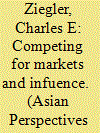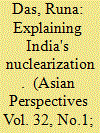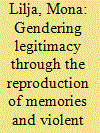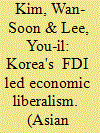|
|
|
Sort Order |
|
|
|
Items / Page
|
|
|
|
|
|
|
| Srl | Item |
| 1 |
ID:
082255


|
|
|
|
|
| Publication |
2008.
|
| Summary/Abstract |
This article discusses the asset acquisitions of Asian national oil companies (NOCs) in the energy-rich states of Russia and Central Asia, and considers the implications for economic and geopolitical stability. Asian NOC investment in these countries is analyzed in terms of state-level political and economic relations, as well as the regional and local impact of NOC activity on the host country. Asian NOCs, and the governments that support them, face few political obstacles in dealing with Eurasia's authoritarian regimes. Asian companies operate in business cultures similar to those in Eurasia, and have fewer reservations about engaging in bribery or corruption than their Western counterparts. These advantages are offset by the entrenched position of Western and Russian oil companies, and a strong commitment of the host states to political and economic independence
|
|
|
|
|
|
|
|
|
|
|
|
|
|
|
|
| 2 |
ID:
082252


|
|
|
|
|
| Publication |
2008.
|
| Summary/Abstract |
This article presents an analytical hybrid of realism and critical social constructivism as its theoretical framework, and representations of (in)securities as an interpretation of politics, to explain India's nuclearization policies. Arguing that a linkage of political leaders' ideologies, articulation of statist identities, and (in)securities defines a state's security practices, I compare how the ideological perceptions of the postcolonial Indian state's leaders have articulated divergent notions of nationalisms, nationalist identities, and (in)securities and corresponding nuclear-policy choices. In charting this comparison, I explore how the political, economic, and developmental insecurities perceived by the Indian state under the Congress Party have become communal/cultural under the Bharatiya Janata Party, thereby facilitating the BJP's justification of India's nuclear-weapon tests. The article thus hopes to add to our understanding about the security problematiques of states and communities.
|
|
|
|
|
|
|
|
|
|
|
|
|
|
|
|
| 3 |
ID:
082253


|
|
|
|
|
| Publication |
2008.
|
| Summary/Abstract |
This article argues that the legitimacy of both male and female politicians in Cambodia is partly built on discourses of violence and reconstructed memories of the past. From this standpoint, this article looks at how women's and men's relation to violence-and memories of violence-creates and undermines their legitimacy as political leaders. Additionally, it relates how women use memories of violence in their strategies to increase their political authority. Based on interviews with fifty-two female and male politicians and nongovernmental workers in Cambodia, this article addresses how discourses on politics rely on notions of "then" and "now" of violence and the images of identity emerging from these
|
|
|
|
|
|
|
|
|
|
|
|
|
|
|
|
| 4 |
ID:
082256


|
|
|
|
|
| Publication |
2008.
|
| Summary/Abstract |
This article argues that Korea's prevailing strong belief in self-sufficiency and the legacy of the state-led and overly regulated external policies which dominated prior to the 1997 financial crisis had become an obstacle to Korea's seeming pursuit of economic liberalism based on inward foreign direct investment (FDI). Although the momentum of globalization ignited during the 1997 financial crisis has enabled Korea to undertake a speedier market opening and draconian structural reforms, there has been no fundamental turnaround yet in the mindset of the Korean government, bureaucrats, corporate sector, or the people in general-the ultimate measure of globalization. This article critically evaluates the impacts of the legacy of the state-led economic development (economic nationalism/mercantilism) model on Korea's newly adopted FDI-led globalization strategy.
|
|
|
|
|
|
|
|
|
|
|
|
|
|
|
|
| 5 |
ID:
082254


|
|
|
|
|
| Publication |
2008.
|
| Summary/Abstract |
This study looks at how proud South Koreans are of their nation's achievements, how strongly South Koreans feel their country is superior to other countries, what factors are important to explain differences in national pride, and how important perceptions on social trust and current political and economic situations are in determining Koreans' level of national pride. The data for this study comes from the Korean General Social Survey (KGSS) of 2003. Age, education, family income, and evaluations of social trust and current political and economic situations are examined as major determinants of national pride. The study finds that South Koreans exhibit greater national pride in their achievement in sports, history, and science and technology than in politics and social welfare systems. Moreover, South Koreans who are younger, better educated, or have higher family income tend to be less proud of their country and are less likely to have strong sentiments of national superiority or allegiance to the nation.
|
|
|
|
|
|
|
|
|
|
|
|
|
|
|
|
| 6 |
ID:
082250


|
|
|
|
|
| Publication |
2008.
|
| Summary/Abstract |
Cooperation in science has become an important part of the relations between China and the United States, and is usefully seen in the context of the worldwide phenomenon of increasing international scientific cooperation. Attempts to explain this increase in international scientific cooperation have called attention to the importance of government-to-government agreements and to self-organizing tendencies within the international scientific community. In the China-U.S. case, however, co-ethnic identity, manifested in coauthoring patterns, seems to be an especially important factor in cooperation as well. This article explores these patterns with an eye toward understanding the complex relationships between transnationalism and our understanding of Chinese nationalism and multiple Chinese identities
|
|
|
|
|
|
|
|
|
|
|
|
|
|
|
|
| 7 |
ID:
082257


|
|
|
|
|
| Publication |
2008.
|
| Summary/Abstract |
This article discusses the analytically unbalanced theorizing in International Relations (IR) when it comes to a region, or subsystem. The tension is between theoretical universalism and contextual exceptionalism, and it is present in the IR community in Korea. If the former group is loyal to the general principles of scientific inquiry of social research, the latter group emphasizes the unique historical experience of Korea and its theorizing efforts to reflect such uniqueness. The author argues that for the IR community in Korea to develop its own name brand, the "Korean School," as an independent and influential force like the English School, it should collectively seek to bridge its perceptual representation concerning historical uniqueness with scientifically theorizing efforts while simultaneously incorporating the general theories of IR with unique regional independent variables
|
|
|
|
|
|
|
|
|
|
|
|
|
|
|
|
|
|
|
|
|